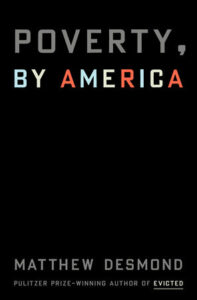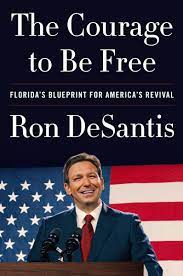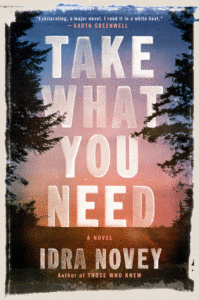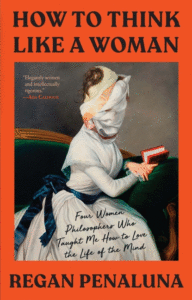
5 Book Reviews You Need to Read This Week
“The two accounts speak for the two (dis)United States, one with nothing left to lose and one afraid of losing everything.”
Our treasure trove of terrific reviews this week includes Margaret Talbot on Matthew Desmond’s Poverty, by America, Laura Miller on Ron DeSantis’ The Courage to Be Free, Sarah Moss on Idra Novey’s Take What You Need, Lydia Moland on Regan Penaluna’s How to Think Like a Woman, and Gabino Iglesias on Margaret Atwood’s Old Babes in the Wood.
Brought to you by Book Marks, Lit Hub’s “Rotten Tomatoes for books.”
*

“Evicted, which won the Pulitzer Prize for general nonfiction, was almost universally acclaimed, praised especially for the vividness of its portraiture. So it’s brave, in a way, that Desmond has chosen such a different approach for his bracing new book. Books about the poor are vital, he says; they do the important work of ‘bearing witness.’ But Poverty, by America, he explains, is a book about how and why the rest of us abide poverty and are complicit in it. Why do many of us seem to accept that the problem is one of scarcity—that there is simply not enough to go around in our very rich country? Where there is exploitation, there are exploiters, and this time Desmond sees many more of them, including most of his prospective readers. Corporations batten on low-wage labor, but so do consumers, who have come to expect the cheap goods and services—the illusorily frictionless food deliveries, the Amazon orders that arrive like conjuring tricks the afternoon you place them—that poorly paid, nonunionized, often temporary workers provide …
More manifesto than narrative, Poverty, by America is urgent and accessible. It’s also austere. There aren’t many stories about individuals; Desmond seems to dole these out with purposeful spareness, perhaps so that we won’t get distracted by them. But the one he tells about himself is affecting … Why do one in eight Americans, and one in six children, live in poverty—a rate about the same as it was in 1970? Why do we put up with it? The short answer, Desmond argues, is that as a society we have made a priority of other things: maximal wealth accumulation for the few and cheap stuff for the many. At the same time, we’ve either ignored or enabled the gouging of the poor… deserves to be one of those books you see people reading on the subway, or handing around at organizing meetings, or citing in congressional hearings. Its moral force is a gut punch.”
–Margaret Talbot on Matthew Desmond’s Poverty, by America (The New Yorker)

“It is now a truth universally acknowledged that The Courage to Be Free, Florida Gov. Ron DeSantis’ No. 1 bestselling campaign book, is boring … What passion exists in the bland gruel of The Courage to Be Free comes in the form of resentment toward this ‘elite,’ which DeSantis patiently explains is composed of people who may lack ‘tremendous aptitude, great wealth, or major achievement,’ yet are nevertheless extraordinarily powerful, controlling ‘the federal bureaucracy, lobby shops on K Street, big business, corporate media, Big Tech companies, and universities’ … This is populism 101, with Ivy League universities and the 1619 Project replacing the Jews and the World Bank as the villains of choice. DeSantis is conservative in the sense that he is against social change, but he has no problem with big government as long as its interventions are made on behalf of his own favored ideology …
Nothing about Trumpolatry is rational, which may be why it has proven so tenacious. It is precisely Trump’s trollish ability to nettle the people his base hates day after day after day that makes his base love him. He is essentially an entertainer, and however boorish his public antics, countless people have confessed that in person he can be formidably charming. No one has ever said this of DeSantis … One thing this dishwater-dull book makes clear: DeSantis is no entertainer. If he isn’t dreading the moment he takes a debate stage to face off against Trump, he should be. I find myself praying that Trump won’t be indicted or convicted in any of the multifarious investigations and trials that entangle him for a couple of years so that this showdown can take place. It will be toxic and spectacular and probably terrifying. But it won’t be boring.”
–Laura Miller on Ron DeSantis’ The Courage to Be Free (Slate)
“The two accounts speak for the two (dis)United States, one with nothing left to lose and one afraid of losing everything, each suspicious of the other, the trust of earlier years corroded away. And yet Take What You Need never feels like a parable. It’s a story about complicated relationships unresolved by death, about ambivalent grief. It’s very much a book for grown-ups in that there are no neat solutions to messy relationships; the characters’ agency is limited by both socioeconomic and familial situations beyond their control, and redemption is not always in the cards …
Like any book with the making of art at its center, Take What You Need holds space for genesis and creative endeavor. Jean is constantly quoting from and reflecting on Louise Bourgeois and Agnes Martin, thinking about women as sculptors and makers on the margins of society. But the happy ending we are offered for the work she leaves behind her is told with crossed fingers … The novel’s cleverness—its commitment to ambivalence and complexity and discomfort—is haunting, and, for a divided nation, it’s a salutary tale.”
–Sarah Moss on Idra Novey’s Take What You Need (The New York Times Book Review)
“One might hope that philosophy, the discipline that prides itself on thinking about thought, would also be thoughtful about itself. If, for instance, half the population had regularly been excluded from its ranks, surely that would be cause for reflection and regret. In How to Think Like a Woman…Regan Penaluna traces her disillusionment when philosophy conspicuously failed at this task. Then she gives us an invigorating vision of what could be gained if it succeeded instead … This story is distressingly common. Among humanistic disciplines, philosophy has the fewest female majors or faculty members. What explains this? One answer is male philosophers’ suspiciously vigorous attempts to define women as precisely the kinds of things that can’t philosophize. Ms. Penaluna describes these theories in a firehose of darkly funny anecdotes. Hegel compared women to plants; Nietzsche said they were bad cooks who ‘delayed human development.’ Wittgenstein expressed relief when they left the room …
Ms. Penaluna recently found herself in a bookstore where a new volume called The History of Philosophy caught her eye. Among the individual philosophers discussed across its 584 pages, not one was a woman. Instead of outrage, she feels contempt. ‘What a pitifully narrow read,’ she thinks. Indeed: Since there is a ‘terror in learning to listen,’ philosophy’s dogged exclusion of women smells a lot like fear.”
–Lydia Moland on Regan Penaluna’s How to Think Like a Woman: Four Women Philosophers Who Taught Me How to Love the Life of the Mind (The Wall Street Journal)
“A dazzling mixture of stories that explore what it means to be human while also showcasing Atwood’s gifted imagination and great sense of humor … These stories, which taken together feel like a mosaic novella more than literary bookends for a collection, offer a deep, heartfelt, engrossing look at the minutiae of life … These tales show Atwood’s characteristic insight and intellect while also putting on full display her ability to make us laugh, her chronicler’s eye for detail, and her unparalleled imagination …
Touching, smart, funny, and unique in equal measure. Atwood, who’s always had her finger on the pulse of modern society, tackles everything from love and the afterlife to the importance of language and the pandemic … Showcases Atwood’s imagination and her perennial obsession with getting to the core of what makes us human while dishing out plenty of entertainment and eye-opening revelations along the way.”
–Gabino Iglesias on Margaret Atwood’s Old Babes in the Wood (NPR)
Book Marks
Visit Book Marks, Lit Hub's home for book reviews, at https://bookmarks.reviews/ or on social media at @bookmarksreads.























